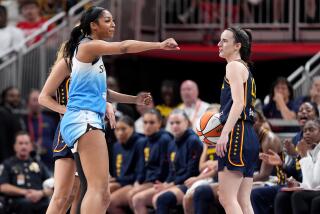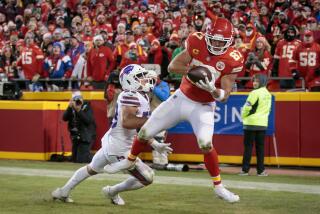Pro Football / Bob Oates : Injuries and Ejection Ruined Buffalo’s Chances
One unusual thing about the National Football League’s winter games this season is that most of the losers have played impressively--none more than the Buffalo Bills.
In the end, the Bills lost at Cincinnati last Sunday, 21-10, but they were in it until many of their best players were injured or ejected.
Finishing off a touchdown drive in the second quarter, Buffalo quarterback Jim Kelly, who is heading for All-Pro someday soon, threw a 9-yard scoring dart to wide receiver Andre Reed to tie the Bengals, 7-7.
Then, after his defense quickly got him the ball again, Kelly moved the Bills from the Buffalo 25 to the Cincinnati 25, where their kicker blew a field goal.
That plainly cost them the momentum, and they never got it back--in part because their All-Pro defensive end, Bruce Smith, played most of the game on one leg.
Before he was injured in the first quarter, Smith, a never-quit rusher who is the essential performer in the Buffalo defense, sacked quarterback Boomer Esiason 3 times in Cincinnati’s first 12 plays.
Smith lost one of those sacks when a teammate drew a penalty on the play, and he lost another when the officials incorrectly penalized him for grabbing Esiason’s face mask. He only grabbed his shirt.
It remains questionable whether the Bengals, as creative as they are, could have won if Smith, linebacker Shane Conlan and four or five other Bills hadn’t been injured, and if cornerback Derrick Burroughs hadn’t first been injured and then ejected for fighting.
As put together by Bill Polian, the most underrated general manager in the league, the Buffalo team, led by Kelly, has the look of next year’s champions.
For many years, hardly anything has been more influential in determining NFL titles than injury luck. And today, that is obviously more than ever true.
To take an uncomplex example, two of the league’s greatest players, wide receiver Jerry Rice of San Francisco and 6-foot 5-inch defensive end Richard Dent of Chicago, were both injured this season.
But only Rice made it back in time for the playoffs.
Suppose it had been the other way around. Who wins last Sunday’s game if Dent is there and Rice isn’t? Could Joe Montana have kept getting the ball off? Who would have caught him?
Here are some of the things that happened this season:
--The Bears, as well as the Bills, were derailed by injuries after playing impressively for much of the time.
--The Washington Redskins, who only occasionally played as well as they had a year ago, were brought down by other problems--the kind that confront and smother all defending champions in a parity era.
--The Minnesota Vikings, with probably the best players in the National Conference, and the Houston Oilers, with the best in the other conference, both played impressively--but not consistently. Both have leadership trouble.
--The Philadelphia Eagles showed another kind of problem. Their talent was too young to make it through the playoffs. In position to score 70 points in Chicago this month--or 42 more than San Francisco scored--they were restricted to 12 by mistakes of inexperience.
--The Cleveland Browns, like Buffalo and Chicago, were knocked out by injuries during a season in which the title could have been won by any of them or by any of six others--Minnesota, Houston, Philadelphia, Washington, Seattle or the Rams--not to mention San Francisco and Cincinnati.
Parity procedures have made it a good, even league.
Coach Sam Wyche’s no-huddle offense in Cincinnati may be football’s greatest development since the huddle.
In any case, it is proving to be as useful to the Bengals as it is shrewd.
For, by standing in place on the line of scrimmage--ready to go--instead of huddling, the Bengals have been forcing opponents to make quicker substitutions than they want to.
As the most conspicuous result of all this, Wyche is still winning. His team will meet San Francisco in the Miami Super Bowl Jan. 22.
The Bengals will be there with a new way of playing the game, one that is plainly both legal and proper. No-huddle football, which antedates the huddle variety by many decades, is as legal as it is intelligent.
The problem is that the only solution that NFL coaches have been able to think of--feigning injuries to stop, first, the clock, and then the Bengals--is illegal, though difficult to prove.
What’s worse, a long series of fake injuries would impact adversely on any football game as a spectator attraction.
To keep that from happening in Sunday’s Buffalo-Cincinnati game, Commissioner Pete Rozelle intervened, sending advisories to both teams.
His action, however, was misinterpreted in Cincinnati, where Wyche thought he had been restrained from quick-snapping the ball. He hadn’t.
Nor will Cincinnati be prevented from quick snaps in the Super Bowl, Rozelle said, adding that the 49ers will definitely be penalized for 12 men on the field if they don’t get their situation substitutes on the premises in time.
That takes care of one thing. But the larger issue remains. Can feigning injuries in football games really be prevented? Could an NFL rule be enforced?
No way.
The moral influence of Rozelle will keep San Francisco Coach Bill Walsh from faking injuries repeatedly next week, no doubt, but no power on earth could stop him from doing it the once or twice that might make all the difference.
In sports, as in all human relationships, there are some problems without good answers. Thus in baseball, when a hitter is beaned, nobody really knows the pitcher’s intent. In football, nobody really knows whether a fallen athlete is injured or feigning injury.
For better or worse, you don’t test positive for lying.
And all things considered, that’s probably just as well.
More to Read
Go beyond the scoreboard
Get the latest on L.A.'s teams in the daily Sports Report newsletter.
You may occasionally receive promotional content from the Los Angeles Times.










